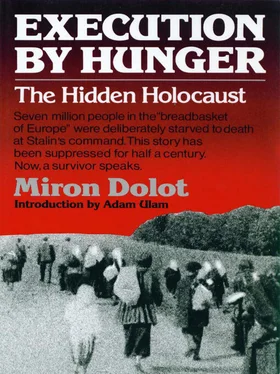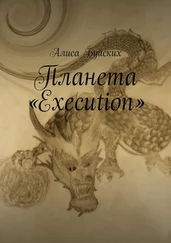Comrade Representative spoke first. The gist of his speech is as follows: a stray ant is of no account; it can become lost in its search for food; it may be mercilessly crushed by someone, as a nuisance, or destroyed by other means. Who cares about a stray, single ant? What really counts is the anthill, for in it the ant’s life is protected and perpetuated. The ants manage to survive only because they live in a close-knit and well-organized ant society. An ant is inconceivable without that society. So it is with human beings: alone, they are helpless; they can be exploited, persecuted, forgotten, or destroyed. Only in the Communist society can an individual find happiness, prosperity, and freedom. The collective farm is everything; the individual is nothing! The collective farm is the first step toward this Communist society; therefore, we all must join it! The Party so orders, and the Party knows what is best for farmers. There is no choice.
After speaking for about an hour, he finished by shouting a widely used Communist slogan: “He who is not with us is against us.” Loud applause followed as he went back to his chair.
The county Party commissar then came forward. He told us that our village had fallen behind in meeting its quotas of collectivization and grain delivery. This happened only because the enemies of the people (whom he called “hyenas”) had gotten the upper hand in the village. The entire country was joyfully building the socialist society, industrializing and collectivizing, delivering grain and subscribing to state bonds, and competing for speedier fulfillment of quotas. Meanwhile, our village was permitting certain enemies of the people to take a dominating position and sabotage the Party’s policy. The Party had uncovered these heinous deeds and would punish these degenerates. We sat silent and stunned. Our breaths were caught in our throats as we waited for these enemies of the people to be identified.
The commissar of the GPU came to the rostrum. He started to look over some papers he held in his hands. Then, taking them in his left hand, he placed his right hand on the holster of his revolver, fixed his eyes upon us, and began to speak.
“I haven’t come here to make a speech. I came here to do my job. You have heard Comrade County Commissar of the Party. He told you that your village is in the hands of the enemies of the people. I came here to help you root out these enemies and make this village a socialist community.”
He paused and again started checking the papers. Then he cleared his throat and declared:
“According to our reliable sources, your village is in the hands of the most undesirable elements….” At this point, he raised his head, assumed a military bearing, and shouted in a loud voice: “The Chairman of the Eighth Hundred step forward!”
A bearded man, wearing an overcoat of homespun cloth, stood up and approached the stage.
“In the name of the workers and peasants and in the name of Soviet justice, I am arresting you for sabotaging the fulfillment of collectivization in your Hundred,” the GPU commissar declared solemnly.
The man looked around in bewilderment and started to say something, but was ignored. Comrade Commissar went on, ordering the chairman of the Second Hundred to come forward. This was Stepan Koshmak, who was despised for his brutal handling of his fellow farmers. We now learned that in spite of his efforts, the Hundred had fallen behind in meeting the state’s collectivization and grain delivery quotas.
Comrade Koshmak also tried to say something, but he was overruled. The commissar then called upon and arrested two other victims: the chairmen of the Third and Fifth Hundreds.
To our great surprise, he also arrested the chairman of the village soviet, Comrade Pashchenko. I already mentioned that he was a member of the Communist Party and had been appointed to his post in our village by the Party Organization and government of our county. Now this same Pashchenko was being arrested for failure to collectivize our village! The commissar maintained that Pashchenko (the commissar did not address him as comrade anymore), used his official position to sabotage Party and government policy in the village.
We were even more surprised when the Commissar mentioned the name of Comrade Ryabokin, the chairman of the collective farm and member of the Party.
“As Commissar of the GPU,” he announced, “I arrest you for failing to prove the advantage of collective farming over that of individual farming; for letting many horses starve to death; for letting the implements rust; and for failing to prepare for spring planting.”
After that, Comrade Commissar turned and left the stage. Two GPU soldiers entered from the side door of the stage. They quickly approached the arrested men and led them out without any resistance. Thereupon, Comrade Zeitlin closed the meeting. It was snowing outside and very cold.
A few hours later, at about seven o’clock in the evening, we arrived at yet another meeting—that of our Hundred. The officials came late. Among them was the Party regional representative. We were “honored” by such a distinguished visitor because we served as a model Hundred which Comrade Zeitlin loved to show to official visitors.
The meeting started as soon as the officials arrived. Comrade Khizhniak, bursting with pride, called the meeting to order and announced that Comrade Zeitlin would speak. Comrade Zeitlin then introduced the representative to us. He pointed out to us that his presence among us should be an incentive. It should be reciprocated by greater participation in socialist competition for the speedy fulfillment of the collectivization and grain delivery quotas.
To our surprise, the representative repeated the same speech he had made a few hours ago at the previous meeting we had attended, almost word for word. Then Comrade Zeitlin arose and announced that Comrade Khizhniak had the podium. Instinctively, we knew that the time for some of us had run out. Comrade Khizhniak appeared elated by the attention his superiors were paying him in allowing him to conduct the meeting.
Usually drunk and cynical, but now sober and outwardly composed, he was trying hard to be at his best. A rumor was circulating among the villagers that during one of his drinking bouts, he had challenged Comrade Judas to a bet: he would become commissar of the county Party organization sooner than Comrade Judas would become a commissar of the GPU. This was probably the reason why he now was trying so hard to impress his superiors by behaving not as a farmer, but as an urbanite.
However, no matter how much he showed off in front of the representative, he did not succeed in his objective. First, he was paying too much attention to the representative. This was a fatal miscalculation on his part. Comrade Zeitlin considered his behavior an affront to himself. After all, as a Thousander, he was a representative of the Central Committee of the Communist Party of Ukraine. Then, as soon as he opened his mouth to start his speech, Khizhniak made his second error: he became more like a politician. He addressed the women first! To be sure he addressed them as “comrade women,” but he put them ahead of the representative, whom he addressed as second in line, and ahead of Comrade Zeitlin who was placed third.
Comrade Zeitlin jumped to his feet and interrupted Khizhniak:
“Comrades,” he said in a surly voice, “as a representative of the Central Committee, it is my duty to correct Comrade Khizhniak.” He disdainfully pointed out that addressing women first was considered by the Party to be a remnant of the past and a sign of decadence. The Communist Revolution made women free and equal with men, thus no preference should be given to them. Comrade Zeitlin ended his interruption by expressing the hope that Comrade Khizhniak would apologize for his error, and with that he sat down.
Читать дальше












